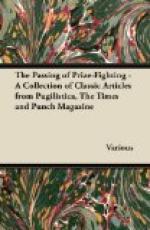“Arbitration is to be
adopted first in disputes
between members of the League,
then meditation by the
Council.”—Liverpool
Paper.
* * * * *
THE TREACHEROUS SON.
I certainly hoped when I took up my quarters in this quiet village that there would be no jarring note to disturb the idyllic peace of my surroundings. And yet I had not been long in this pleasant sitting-room, with its outlook on blossom-laden fruit-trees, creamy-spired chestnuts and wooded down, before I became aware that a pitiful and rather sordid little domestic drama was in progress within fifty yards from my open windows. I discovered a son in the act of encouraging his aged and apparently imbecile parent to gamble with a professional swindler! Not that I have actually seen them thus engaged. As a matter of fact I have merely heard a few short remarks—and those were all spoken by the son. But, as everyone knows, even a single sentence accidentally overheard by an observant stranger may give him a clearer insight into the unknown, and possibly unseen, speaker’s character than could be gained from countless chapters of a modern analytical novel.
So these four sentences were quite enough for me. Perhaps I should mention here that the three personages in this drama are birds—which makes it all the more painful.
Like many of our British birds, the sole speaker occasionally drops into English, or I should never have understood what was going on. He may be a blackbird or thrush, but I doubt it, because I know all their remarks, while his are new to me. If A.A.M. heard them he would probably tell me they were those of a “Blackman’s Warbler,” and I should have believed him—once. Hardly now, after he has so airily exposed his title as an authority; but even as it is I should not dream of questioning his statement that “the egg of course is rather more speckled,” because I can well believe that the egg this bird—whatever he is—came from was very badly speckled indeed.
It seems that, some time ago—I can’t say when exactly, but it was before I came down here—this unnatural son introduced to the parental abode (which I think is either No. 5 or No. 6 in a row of young chestnuts abutting on the high road) a rook of more than dubious reputation, whom he persuaded his unsuspecting sire to put up for the night. And there the rook has been ever since. As I said, I have neither heard nor seen him, but I’m positive he’s there. I am unable to give the precise date on which he first led the conversation to the good old English game of “rigging the thimble”—that also was before I came. All I can state with certainty is that he interested his host in it so effectually that now the infatuated old fool is playing it all day long.
This is evident from his son’s conversation; during the pause which invariably precedes it I should undoubtedly hear the father-bird (if he would only speak up—which he doesn’t) quavering, “I’m not sure, my boy, I’m not sure, but I’ve a notion that, this time, he’s left the pea under the middle thimble—eh?”




